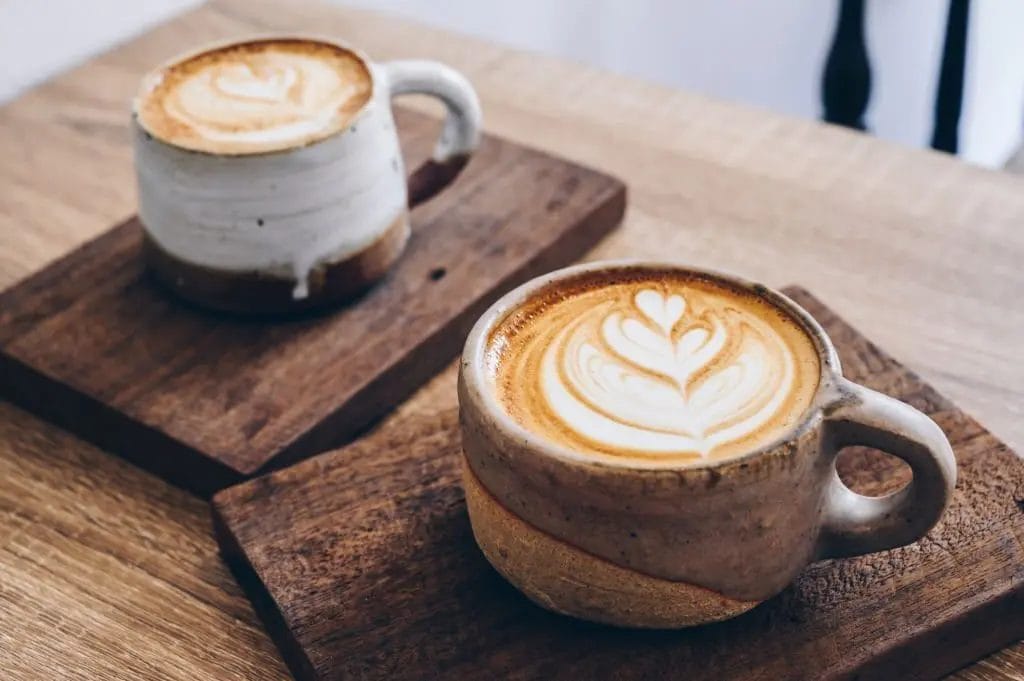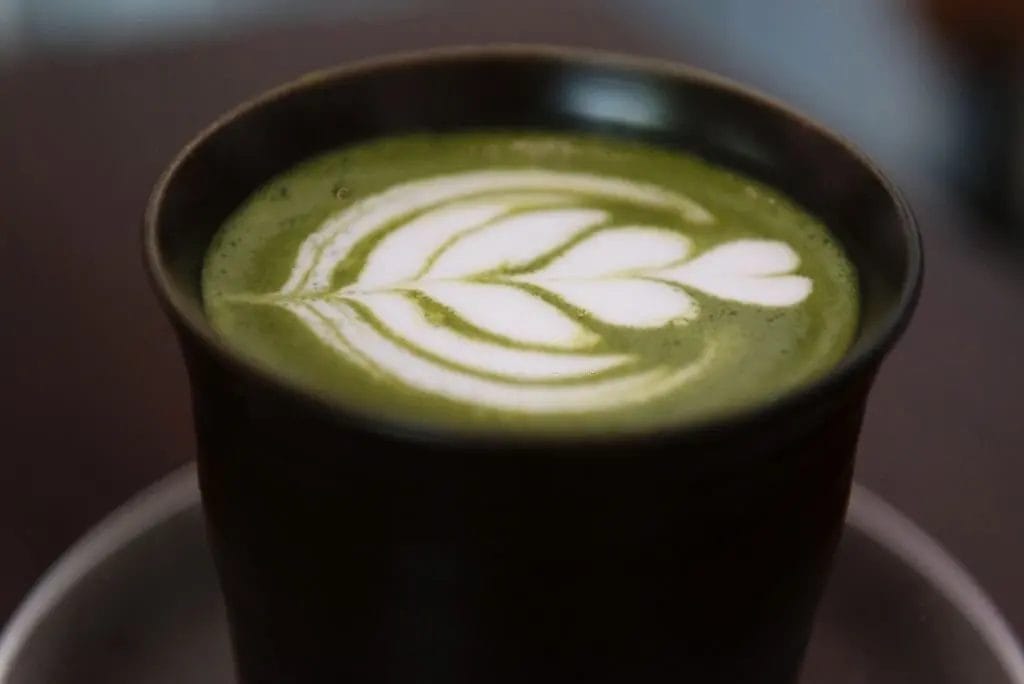Coffee has been the go-to choice for an energy boost for centuries now. In the battle of Matcha vs Coffee, Matcha is a more recent trend that came in as a surprise, despite existing for a while. So it’s not a surprise that we’ll try to compare both in an article.
As always, we’ll follow the basic formula of getting to know the drinks in question before going into the details.
Coffee
The drink that everyone knows without needing any introductions, coffee is the most popular drink that serves as a stimulant and energy supplement for millions of coffee lovers worldwide.

Coffee is produced from coffee beans found in coffee cherries. They are called beans, but they are actually coffee seeds that grow in coffee plants.
Coffee originated in Ethiopia and is native to tropical Africa and Asia. But presently, it’s grown in dozens of countries worldwide, with Brazil taking the crown for the highest coffee-producing country.
A few more top coffee-producing countries that are in the top 10s are:
- Vietnam
- Colombia
- Indonesia
- Ethiopia
- Kenya
Coffee beans are collected from the ripe coffee cherries that undergo thorough processing. The outcome of this process is dry coffee beans that are ready for roasting and grinding.
The ways to brew a cup of coffee have endless possibilities, and each type of brewing method can provide you with a wide array of different coffee drinks.
Matcha
Matcha is more of a tea than coffee. Matcha comes from the Camellia Sinensis, a plant native to China, making the country the origin of Matcha.

Japan got introduced to Chinese tea seeds back in the eighth century, but Matcha didn’t come into the scene for another few hundred years. Matcha was brought back from China by a Buddhist monk named Eisai.
After that, Matcha got established among tea drinkers of Japan as its own thing and became a significant part of Japanese tea culture.
Matcha is made from the leaves and buds of the Matcha tree, which are grown under partial shade before harvest. Under these conditions, the green tea leaves start producing more chlorophyll to compensate for the lack of nutrition coming from sunlight.
With the extra chlorophyll produced in the tree, the entire leaf becomes a darker shade of green and more flavored, along with extra nutritions.
After harvesting and processing, the leaves are ground into a fine, bright green powder that you can infuse into the water like tea powder and make yourself a fine cup of Matcha.
Core Differences: Matcha Vs. Coffee
Since Matcha and coffee both act almost the same, the only differences you can find are in their core elements. So here are the 3 core differences between these two popular drinks.
DIfference #1: Caffeine Level
The section’s name alone should answer your question if Matcha contains caffeine. Though coffee is the go-to for everyone for the caffeine boost, Matcha can provide you just as a decent caffeine boost as coffee.
Let’s compare Matcha with Espresso to make the comparison easier. A single eight-ounce cup of Espresso contains around 60 milligrams of caffeine. Half a teaspoon of Matcha, the recommended serving size, contains 30 milligrams of caffeine.
But since most matcha consumers like to add in a whole teaspoon of it, the caffeine count rises to an equal level of a cup of Espresso.
But this doesn’t apply to all types of coffee. Depending on the brewing methods, roasting method, or extraction time, a cup of coffee can have different amounts of caffeine, so the count can be higher or lower.
Though Matcha doesn’t contain as high caffeine as many types of coffee, it still can provide a decent boost to get you through the day.
DIfference #2: Acidity Level
Matcha wins here since the acidity of coffee is higher compared to Matcha. You remember the pH level calculations, right?

On a pH value scale, the score of standard coffee ranges between 4.85 and 5.13. On the other hand, Matcha has lower acidity with a pH score of around 9.
If you’re a person with a sensitive stomach or having bad acid refluxes, it’s best to avoid coffee. Though Matcha contains caffeine, the caffeine in Matcha is more suppressed, and the caffeine intake can be controlled just by using lesser amounts of matcha powder.
There is an exception where you should avoid caffeine; after all, let it be Matcha or coffee. And that is GERD (gastroesophageal reflux). In that case, caffeine has a high chance of relaxing your LES (Lower esophageal sphincter), and the results are highly unpleasant.
Difference #3: Calorie Level
To compare calorie levels, you’ll need to compare both drinks without any kind of milk or additives, and all pure.
But when you consider it like that, coffee comes out as the winner since black coffee, without any additives, contains next to zero calories or carbs. And since the amount of caffeine content present doesn’t change the number of calories, decaf is zero-calorie too.
Matcha, on the other hand, contains 2.76 kcal per gram. Though it’s not high enough to make a dent in your perfect diet plan, it’s still a lot more than what you can find in regular coffee.
How Matcha WIns Over Coffee
This may sound like a claim too big, and you might be thinking, “Coffeenom is saying coffee has been outclassed by some green powder?”

As much as I hate to admit it, it’s a fact that Matcha has several reasons to win over coffee.
Reason #1: Matcha Saves You From Caffeine Crash
Caffeine keeps us going through the tedious process that is called work while letting us hang on to the bits of our sanity that are left after going through half a week. Trust me, I know that feeling.
But when you’re trying to have that feel to carry over the next few hours, it’s easy to forget about the side effects and chug down a few cups of coffee. But when this temporary rush of energy wears off, it only worsens things.
To continue at the same pace, your body keeps asking for more caffeine. But when you want to sleep, you stop coffee intake even when the body wants it. So what happens when the body can’t find enough caffeine to function on? You face a caffeine crash.

Here’s where Matcha comes in for the rescue. While providing you the caffeine to stay awake, Matcha actually makes sure that your body doesn’t crash from having too much caffeine in the system.
Matcha contains the amino acid L-theanine, which has multiple benefits. A mentionable benefit here is the slow exposure to the effects of caffeine.
This unique amino acid can slow the release rate of caffeine in your system, which keeps you up for a more extended period, maintains stable physical performance, and you don’t have to fear coming down from a sudden caffeine spike in the system.
Having fun Nomies? Why not check our piece on instant coffee vs ground coffee.
Reason #2: Say Goodbye To Nervousness And Jittery Feelings
Remember how caffeinated drinks can make you feel nervous and jittery if you drink too much of them? These are the most common side effects seen in people sensitive to caffeine. However, Matcha doesn’t have that effect, thanks to the L-theanine phytonutrient.
Instead of making you agitated, this nutrient creates a calm sensation for your nerves that can help you reduce signs of stress and anxiety. Matcha achieves this by increasing the alpha brainwaves, which takes away the feeling of sleepiness or drowsiness.
Reason #3: Matcha Is Better For Oral Hygiene
Coffee can stain your teeth if you drink it regularly for more extended periods and sometimes cause bad breath. Which, of course, severely reduces your charm factor. The chemical that causes the stain is called tannins, a type of polyphenol present in coffee drinks.
Matcha has several antibacterial properties that don’t only help you with keeping your mouth fresh. Still, it’s also proven to be better for protecting your dental health and preserving your overall oral health.
Reason #4: Matcha Makes You Feel More Positive And Focused
You can focus on things easier with a positive mindset when you’re in a positive mood. A cup of matcha tea increases the level of serotonin and dopamine in your brain. Both of these chemicals are associated with mood enhancers.
With an extra level of serotonin boost, stabilized mood, and near-zero depression provided by the anxiety management properties of Matcha, say goodbye to work stress and get busy!
Reason #5: You Get To Enjoy Benefits Of All The Antioxidants
Matcha contains valuable antioxidants just like coffee, but the difference is you can actually absorb all of them, and the defense system in your body can apply them accordingly.
The most important of all these is that the antioxidants in Matcha can actively prevent cancer cell growth, preventing different types of cancer. It also reduces the risk of heart disease.
Reason #6: Matcha Offers A Detoxification Of The Whole Body
Among hundreds of valuable nutrients, a handful that you can find in Matcha is:
- Vitamin A
- Vitamin C
- Calcium
- Iron
- Protein
- Potassium
When your body is high on these materials, your inner defense system has a better chance to purge all the unwanted components.
The increased amount of chlorophyll that the Matcha contains is also considered a natural detoxifier that helps your body get rid of various toxins and metallic substances lurking in your body, waiting to harm you.
Reason #7: Matcha Helps With Weight Loss, But Better
Coffee can help you with fat burning to an extent, which we’ve already established.

Yes, Matcha is a better option if you want to burn your calories faster. 4 times faster, to be precise. Matcha increases your metabolic rate by a significant amount, which helps you burn calories at a faster pace.
Reason #8: You Will Benefit From The Anti-Aging Properties Of Matcha
Who doesn’t want to look younger? So instead of spending thousands on beauty products, why not involve Matcha in your daily beauty routine?
The antioxidants present in matcha fight off the harmful effects of UV radiation on your skin and fend off skin diseases and germs that can affect the skin.
And when your skin looks fresh, there’s no doubt you’ll have a glow up in your overall appearance no matter how old you are.
Reason #9: Matcha Doesn’t Cause Acid Refluxes
Matcha contains less acidity than traditional coffee, and as a result, it doesn’t cause acid reflux like traditional coffee does.
If you have a sensitive stomach, it’s better that you take up Matcha for fulfilling your caffeine needs.
Reason #10: Matcha Saves You More Money Than Coffee
And if all that benefit above doesn’t convince you enough to get your hands on a bag of matcha powder, this one will work for sure.
Now I don’t mean to be passive-aggressive towards people trying to save money because we all are at this point. And Matcha can help you save a decent amount of money, ranging from $20-$25 a week, depending on the brand.
Had fun reading about matcha vs coffee?
You’ll love to read our piece on americano vs long black coffee.
Bottom Line
Matcha may have existed for centuries in the tea/coffee scene; it’s only become a trending drink recently. But, as someone who thinks twice before jumping on the bandwagon, this is a trend I’ll follow happily.
If you’ve already decided to give this ancient delicacy a go, enjoy your drink.
Cheers!
FAQs
A tablespoon full of matcha powder contains 60mg of caffeine.
Matcha is a type of green tea that contains caffeine.
It’s easy to confuse Matcha with coffee since Matcha contains caffeine. But unlike caffeine, Matcha is made from the leaves of the matcha tree, and the leaves act just like tea leaves.
Many find the health benefit offered by Matcha better than the ones that coffee offers, so it’s understandable if people are switching from coffee to Matcha.
Coffee is made from coffee beans that farmers collect from coffee cherry fruits.

